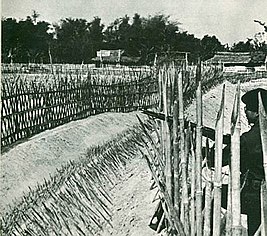
Back برنامج هاملت الاستراتيجي Arabic Strategic Hamlet Program German Programme hameau stratégique French 戦略村 Japanese Programa de Aldeias Estratégicas Portuguese Ấp Chiến lược VI 战略村 Chinese

The Strategic Hamlet Program (SHP; Vietnamese: Ấp Chiến lược ) was implemented in 1962 by the government of South Vietnam, with advice and financing from the United States, during the Vietnam War to combat the communist insurgency. The strategy was to isolate the rural population from contact with and influence by the National Liberation Front (NLF), more commonly known as the Viet Cong. The Strategic Hamlet Program, along with its predecessor, the Rural Community Development Program, attempted to create new communities of "protected hamlets". The rural peasants would be provided protection, economic support, and aid by the government, thereby strengthening ties with the South Vietnamese government (GVN) which was hoped would lead to increased loyalty by the peasantry towards the government.[1]
Colonel Phạm Ngọc Thảo, a communist sleeper agent of North Vietnam who had infiltrated the South Vietnamese army, was made overseer of the Strategic Hamlet Program and had hamlets built in areas with a strong NLF presence and forced the program forward at an unsustainable speed, causing the production of poorly equipped and poorly defended villages and the growth of rural resentment towards the government.[2]
The Strategic Hamlet Program was unsuccessful, failing to stop the insurgency or gain support for the government from rural Vietnamese, it alienated many and helped contribute to the growth in influence of the NLF. After President Ngo Dinh Diem was overthrown in a coup in November 1963, the program was cancelled. Peasants moved back into their old homes or sought refuge from the war in the cities. The failure of the Strategic Hamlet and other counterinsurgency and pacification programs were causes that led the United States to decide to intervene in South Vietnam with air strikes and ground troops.[1]
- ^ a b Tucker, Spencer, The Encyclopedia of the Vietnam War: A Political, Social, and Military History, ABC-CLIO, 2011, p. 1070.
- ^ Karnow, Stanley (1997). Vietnam: A history. New York: Penguin Books. p. 274. ISBN 978-0-670-84218-6.